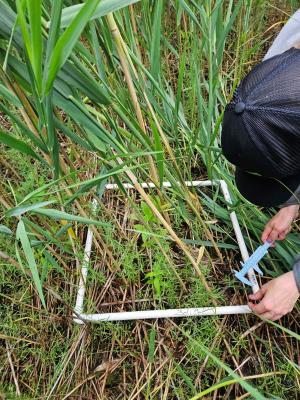Over $500,000 of Great Lakes Restoration Initiative (GLRI) funding is being distributed by the Great Lakes Commission (GLC) through the Phragmites Adaptive Management Framework (PAMF) to improve management outcomes for treatment of the non-native Phragmites australis (common reed). Phragmites is a fast-growing non-native wetland plant species that has invaded much of the Great Lakes Basin. Phragmites can spread rapidly and outcompete native vegetation, thus contributing to landscape-scale ecological degradation. An extensive amount of time, effort, and resources are spent annually to control this problematic species, but site-specific guidance on best management approaches is still limited. To address this gap in management guidance, the Great Lakes Phragmites Collaborative (GLPC), a collaboration between the Great Lakes Commission, U.S. Geological Survey, University of Georgia, and other academic and management organizations, created and ultimately implemented the PAMF program in 2017.
PAMF is a participatory science program designed by the GLPC, including an interdisciplinary Science Advisory Team and Technical Working Group. The program uses Phragmites management data provided by land managers from around the Great Lakes Basin to help a predictive computer model “learn” about which Phragmites management approaches achieve the best outcomes. The model predicts which management actions will be most effective, and then each summer PAMF offers this guidance to participating land managers for the following year. The model outputs improve each year as incoming data characterize how the plant responded to the previous year of management. However, some management actions in the model are not widely used by managers and thus are underrepresented in the model. Therefore, a new Active Adaptive Management Program (AAMP) was initiated in 2024 to stimulate application and data collection of underrepresented treatment combinations, accelerate model learning, and improve management outcomes.
In March 2024, PAMF-AAMP released a request for proposals, through which land managers could apply for individual grants (most ranging from $5,000-$30,000) that provide the financial resources for testing specific management predictions. In September of 2024, the first round of individual grant recipients was announced, and management actions began shortly thereafter. For at least the next two years, AAMP participants will implement, monitor, and report impacts of specific Phragmites management actions that have fewer representation in the PAMF model data inputs. Results from this targeted AAMP program will be used to refine the PAMF predictive model and improve the effectiveness of future Phragmites management efforts.
Learn more about the Phragmites Adaptive Management Framework and the Active Adaptive Management Program.


